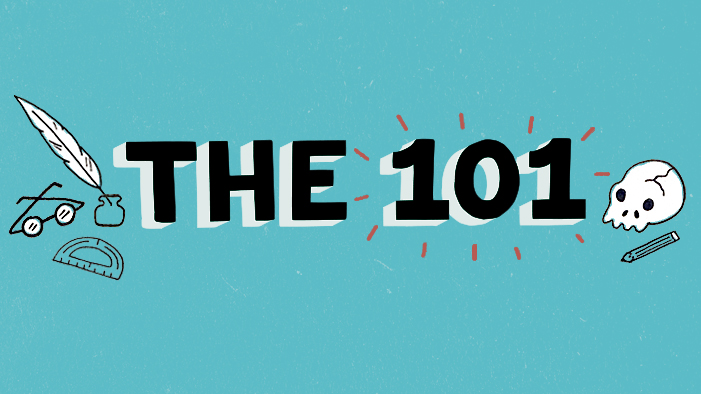How to Write a Killer Thesis Statement

This post was originally published in April 2016
We’ve all been there: sitting in front of a blank word document, staring down the blinking cursor, a writing prompt and a couple pages of notes laid out on the desk. The first step to really starting a paper is coming up with a solid thesis—after all, your thesis statement is the crystallized version of what you’ll spend five-to-seven pages trying to prove. Writing a paper is hard, but writing a good thesis doesn’t have to be. Here are some pro tips:
The “Thesis Machine”
This is a technique my first writing professor taught me. It’s a reliable jumping off point for when you’re just trying to get a thesis down. The pattern’s simple—here’s an example:
TOPIC: Hufflepuffs
TOPIC + POSITION: Hufflepuffs make the best friends
TOPIC + POSITION + RATIONALE (Think of this as the “because” step): Hufflepuffs make the best friends because they are accepting and loyal.
TOPIC + POSITON + RATIONALE + QUALIFICATION (The “although” step): Although they are often overlooked and considered oddballs, Hufflepuffs make the best friends because of their deep-seated values of loyalty, dedication, and acceptance, all crucial traits in any friendship.
And there you have it—by slowly building upon your initial topic, you’ve got a position, a reason behind it, and a nod towards the opposing viewpoint (which you’ll have a chance to argue against in the essay itself). This technique saved me time and time again in college, especially late at night, chewing my pencil and chugging coffee because I had no idea what I was doing. It may seem simple, but it’s surprisingly versatile and won’t let you down.
The “So What?” Test / Miscellaneous Tips
Once you’ve got your initial thesis, it’s important to make sure what you’re about to spend 1,500 words defending is important. The way I see it, since a) papers are usually boring, and b) we crank them out because we’re forced to for class, we forget that the point of any essay is to convince somebody—not just to throw out a bunch of information. If you were to read your thesis aloud in a crowded room and everyone agreed with you (or, worse, no one cared enough to disagree), it’s a lame thesis. It’s that simple. A thesis should be a thought-out argument that stirs up some controversy. The goal should be to make your reader scratch her head and reconsider her previous beliefs.
A word to the wise: avoid “shopping lists” at all costs. This is something I used to do in high school: I’d rattle off a bunch of unrelated thoughts and ideas, hoping that they would somehow magically fuse into an argument (or convince my teacher that I knew what I was talking about). The beauty of a good thesis is that it holds your entire paper together, and it sets up a roadmap for where you’re going to go next. With the Hufflepuff example, I would probably write a paragraph about loyalty, a paragraph about dedication, a paragraph about acceptance, and a paragraph acknowledging the opposing viewpoint, and my reader would know that just from the thesis alone. It’s a way of organizing your essay, and, if done right, it’ll prevent your reader from getting lost.
Another big NO: a thesis that’s painfully obvious to everyone. If my thesis were, “Hufflepuffs are often overlooked,” my paper would be about as interesting as a lecture on microeconomics; everybody knows Hufflepuffs are often overlooked, so why should I waste my reader’s time by writing about it?
Finally, keep it specific and concise. That means no Huge Historical Sweeps (“throughout time,” “since the dawn of man,” “age-old”), and no Huge Population Sweeps (“humanity,” “mankind,” “society”). If you go big like that in your first paragraph, you’re opening up a can of worms too big to handle in just a short paper. And stay away from vague, judgmental words too (like “good,” “important,” “bad,” “problem,” etc.). The key is to focus in on what you want to say, tell your reader what you’re going to say, and then say it—brilliantly!
Final Thoughts
A well-formed thesis sets the tone for your entire paper and gives it shape. If you’ve ever tried powering through a first draft without already having a clear thesis down, you know how rough it is—there are few feelings worse than getting halfway through an essay and then realizing you have no idea what point you’re trying to make. Look at any essay as a challenge to start an argument rather than a blah assignment, and think of your thesis as that argument in its purest form. Say that Harry is a whiny wimp! Make a case for Draco as Hogwarts’ Most Dateable Wizard! Whatever you do, make it interesting, make it controversial, and make it something worth debating. (Here’s a secret: some of the best papers I ever wrote were arguing the opposite of what I actually believed—it can be a lot of fun seeing just how zany you can get while still raising good points.) As someone who has suffered through (and survived!) high school and college, and then gone on to teach writing at a college level, I can confidently tell you that if you write a thesis that’s clear and unforgettable, your teachers and professors will thank you with a higher grade. Now get off SparkLife and start that essay you’ve been procrastinating!














